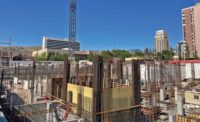Leaders of Colorado’s built environment are feeling generally hopeful and optimistic, according to results of a first-ever statewide survey released in late September by the Everitt Real Estate Center at Colorado State University.
The survey provides a first-of-its kind view from the three major sectors involved in the built environment in Colorado, including architectural, construction and commercial real estate professionals. The findings highlight the greatest pessimism among the commercial real estate sector related to challenging national issues, such as the impact of national debt ratings on financing, regulatory guidelines and employment growth. Leaders among architectural and construction sectors expressed more optimism, but retained serious concerns about the future as well.
The statewide survey involved 402 respondents and was coordinated by the Everitt Real Estate Center in CSU’s College of Business and CSU’s Dept. of Construction Management in conjunction with the Colorado chapters of the American Institute of Architects, Associated Builders and Contractors Inc. and the Associated General Contractors.
Findings of the survey, unveiled during September’s 15th Annual Northern Colorado Real Estate Rendezvous Conference, include:
• Architects have a less optimistic 2012 outlook for contractors and commercial real estate sectors alike, yet commercial real estate respondents are fairly optimistic for the construction industry in 2012.
• Prospects of private funding for new development projects in 2012 were predicted to be dismal by all three sectors represented in the survey.
• Increase in competition remains a major trend and concern, although contractors appear to be responding to the challenge by increasing their services, while the commercial real estate sector appears more focused on their core services.
• Architects predicts less reliance on new development as a business catalyst over the next five years, while contractors expect new construction to dominate future billings.
• Contractors expressed more optimism than architects regarding employment growth in their firms in the new year, although backlog expectations in 2012 are expected to remain stable.
• Architects believe demand for residential-oriented projects are most likely to increase in 2012, and commercial real estate respondents believe such property types will most likely see a modest appreciation in value in 2012.



